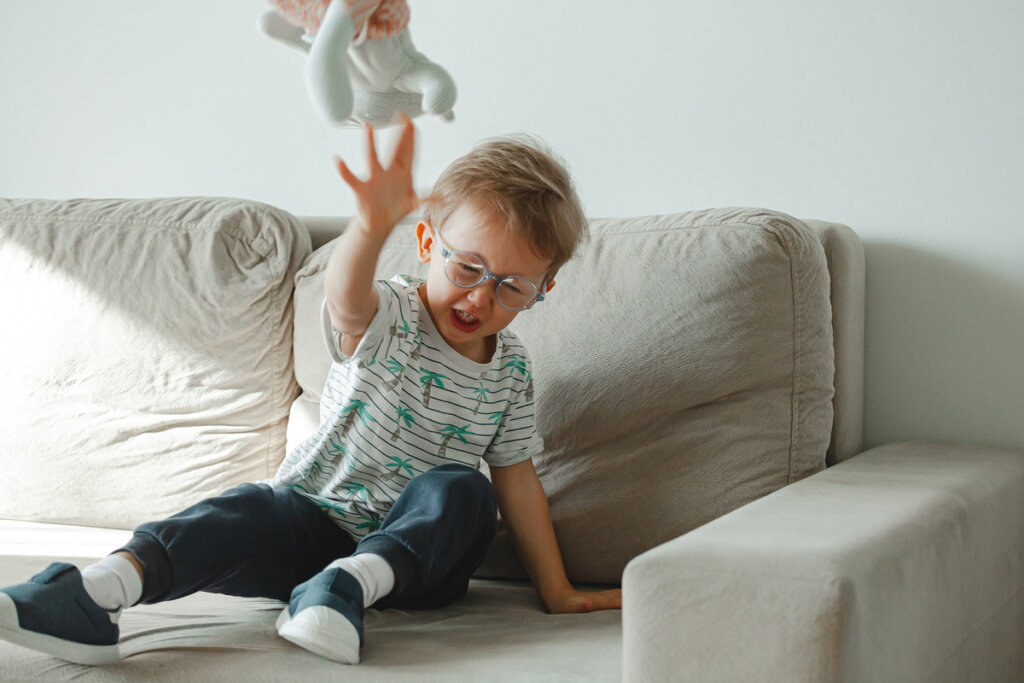Why Children Misbehave When They're Tired


Written and verified by the psychologist Valeria Sabater
Have you ever taken your kids to a restaurant where they did nothing but misbehave? These are common occurrences in families that test parents’ patience to the limit. In fact, we might even find ourselves saying that we won’t go out to eat again until they’re older. However, before making such a drastic decision, there’s another aspect we should take into account.
When children are tired, hungry, or bored, their negative behaviors increase. Their emotions are so intense that they overflow and overwhelm them. Therefore, we shouldn’t necessarily blame our children for their bad behavior. It’s better to try and understand what lies behind it. Let’s consider what childhood neurobiology has to say on the subject.
Children’s brains haven’t yet matured. This means they have few resources with which to exercise self-control. Consequently, when they feel gripped by experiences as disturbing as exhaustion or appetite, their nervousness intensifies. If adults react to their behavior with reprimands or punishments, their discomfort will escalate to epic proportions.
There are many reasons why children misbehave. Sometimes, they’re seeking our attention and at others, they may be testing our limits. However, let’s bear in mind that, in most cases, behind a child’s negative behavior, lies a poorly regulated emotion. Let’s dig a little deeper into this subject.
Young children don’t usually possess the linguistic skills to express what’s happening to them, like feeling hungry or tired. Instead, they manifest their feelings with negative or defiant behaviors.

Hyperactivity and misbehavior
Naturally, we’d all love for our three or six year old to be able to explain to us what’s happening to them when they misbehave. But they won’t be able to verbalize their emotions until well into adolescence. Moreover, they often experience so many sensations, feelings, and needs, that they simply don’t know how to act in the face of so much chaos.
What they do is to react in the least adapted way and get carried away by what they feel, by their internal whirlwind. This is often witnessed by parents or grandparents picking up the little ones from daycare or school. The more tired they are, the more protests they make, the more tantrums they have, and the less attention they pay to the adults around them. In fact, they despair and their caregivers despair even more.
Added to this is the fact that we often subject our children to the same long days as ours, as adults. They get up early and, when they finish school, they continue with their extracurricular sessions: English, basketball, swimming, ballet, music… We’re educating our new generations in hyperactivity and hyper-demand. It’s hardly surprising that this has consequences.
Sometimes, it’s not just physical exertion that leaves children feeling exhausted. Boredom, hunger, and even frustration can tire them out. In certain cases, this translates into bad behavior.
Tiredness, lack of self-control, and poor emotional regulation
We now know that the human brain doesn’t finish maturing until after the age of 20. It’s around that age that important areas like the prefrontal cortex finish forming. Until then, youngsters exhibit problems in regulating their impulses and behaving sensibly.
As well as experiencing difficulty in controlling themselves, children also have problems understanding their emotions. Tiredness, frustration, and hunger can make them more irritable. They also might have problems focusing their attention and obeying the adults around them.
The University of North Carolina at Greensboro (USA), conducted a study that claimed in the early years of childhood, it’s essential that we guide our children in learning emotional regulation. This is the competence that makes it easier for them to establish executive functions such as attention, memory, reflection, problem-solving, etc.
Children don’t always understand what’s happening to them when they feel overwhelmed by exhaustion, sadness, hunger, or stress. The only thing they experience is discomfort and they don’t hesitate in letting themselves be carried away by it. Therefore, it’s crucial that we guide them in learning and regulating these internal states.
Bored or lonely children = angry children
When children are tired, they become more irritable and less patient. However, there are also other variables we should take into account For example, their misbehavior could be due to boredom or feelings of loneliness. Indeed, we can’t ignore the fact that, as parents, due to work reasons, we often can’t spend as much time with our children as we’d like.
They miss us giving them our attention. Moreover, it often translates into frustration and unregulated behavior. They feel bored, sad, and disappointed. After all, they don’t know how to handle their inner emptiness and they sometimes fill it in the worst way possible, with screens or video games.

What can we do?
The most important thing we can do as parents, grandparents, or educators is to understand the needs of our children. This implies knowing how their brains are developing at each developmental stage and encouraging them in what’s important at each phase. This will help them understand, identify, and regulate their emotions.
In addition, we must ensure that our children have enough time to rest and play. An exhausted child will be more prone to tantrums, as will a child who doesn’t know how to handle their boredom. So before giving them a tablet or a game controller, offer them a sketchbook to express themselves. Allow their boredom to transform into creativity.
Finally, always remember that behind bad behavior there are certain realities we must understand. Let’s try and avoid resorting to sanctions or punishment and understand what our children want from us. Maybe they just need some attention and don’t know what to do with the emotions they’re grappling with.
All cited sources were thoroughly reviewed by our team to ensure their quality, reliability, currency, and validity. The bibliography of this article was considered reliable and of academic or scientific accuracy.
- Graziano PA, Reavis RD, Keane SP, Calkins SD. The Role of Emotion Regulation and Children’s Early Academic Success. J Sch Psychol. 2007 Feb 1;45(1):3-19. doi: 10.1016/j.jsp.2006.09.002. PMID: 21179384; PMCID: PMC3004175.
- Leah S. Richmond-Rakerd, Avshalom Caspi, Antony Ambler, Tracy d’Arbeloff, Marieke de Bruine, Maxwell Elliott. (2021) Childhood Self-Control Forecasts the Pace of Midlife Aging and Preparedness for Old Age,”Proceedings of the National Academy of Sciences, Jan. 4, 2021. DOI: 10.1073/pnas.2010211118
- Tao T, Wang L, Fan C, Gao W. Development of self-control in children aged 3 to 9 years: perspective from a dual-systems model. Sci Rep. 2014 Dec 11;4:7272. doi: 10.1038/srep07272. PMID: 25501669; PMCID: PMC5377018.
- Tarullo, Amanda & Obradović, Jelena & Gunnar, M.R.. (2009). Self-control and the developing brain. Zero to Three. 29. 31-37.
- Weitzman C, Wegner L. Promoting optimal development: Screening for behavioral and emotional problems. Pediatrics. 2015;135(2):384-95. doi:10.1542/peds.2014-3716
This text is provided for informational purposes only and does not replace consultation with a professional. If in doubt, consult your specialist.








